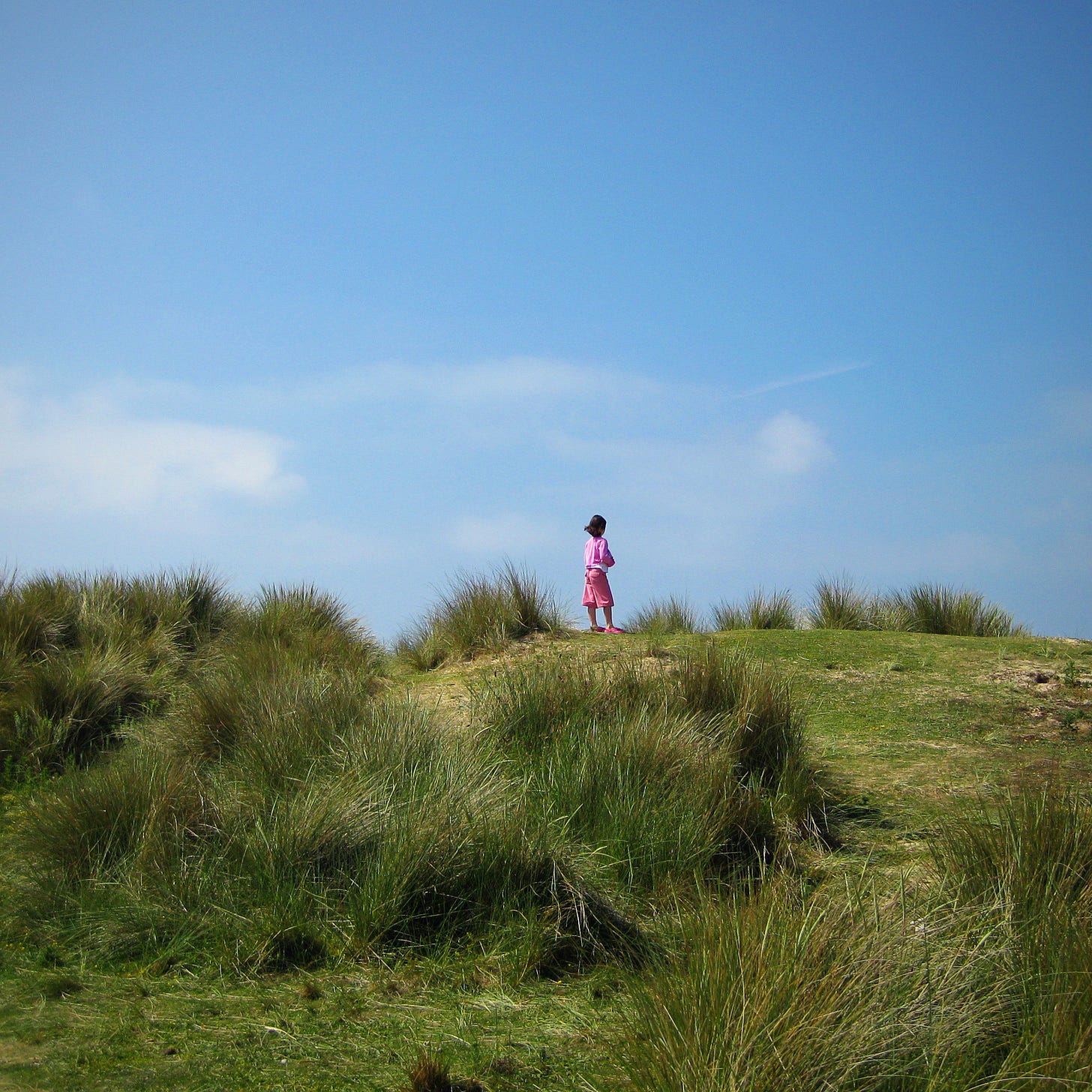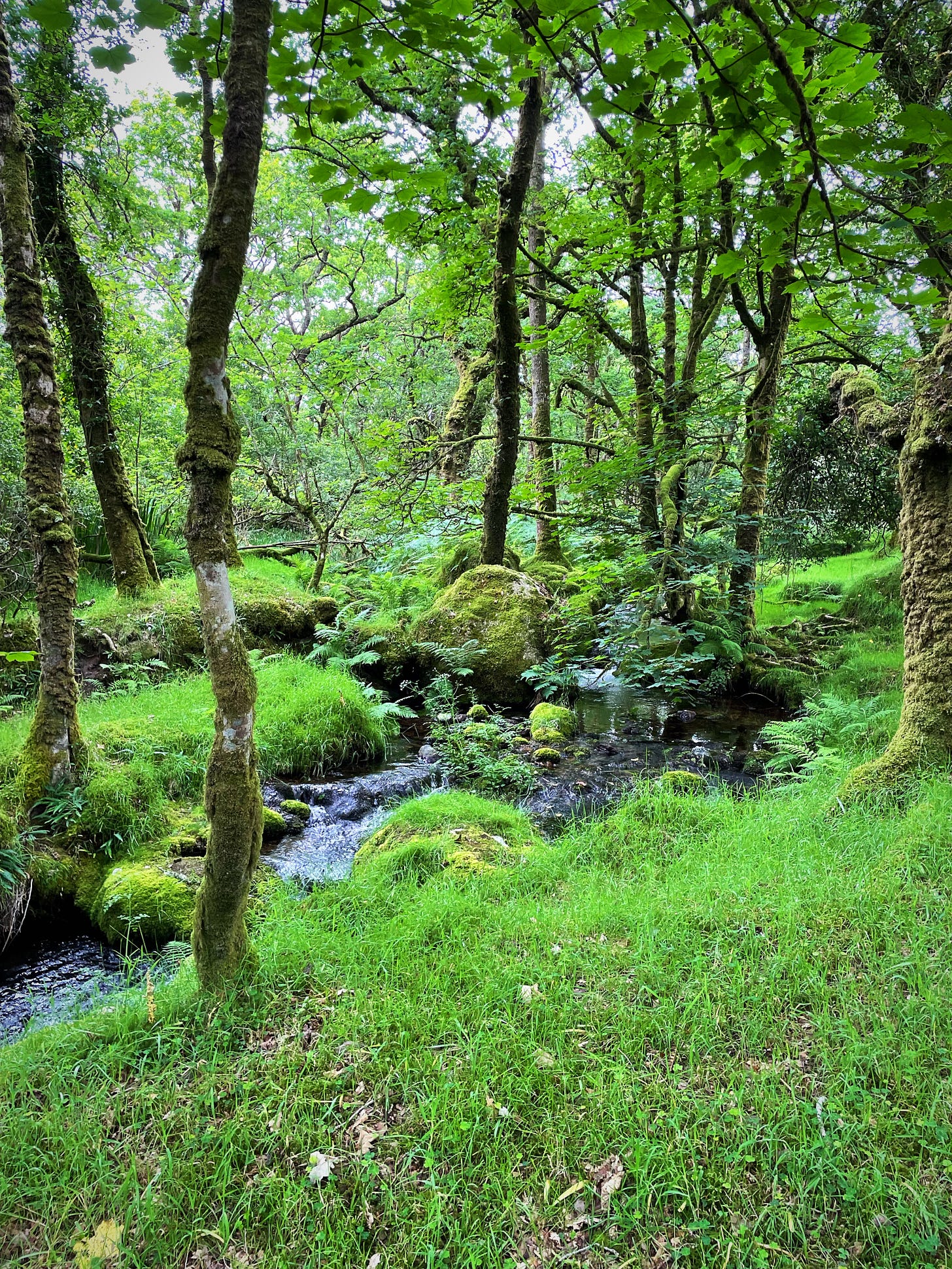Walking to unplug
Ditch the devices and take a digital detox
Hello walkers and writers 👋🏻
If you’re new to The Writer’s Walk – welcome! I’m Sarah, a writer and walker. I combine my enjoyment of both things to boost my physical and emotional wellbeing, and inspire my writing. In these posts, I share an approach to taking a walk – our theme – pair it with a simple writing prompt, and invite you to try it for yourself.
In this edition I share a little bit about how I learned to channel the positive effects of walking into creativity, together with some tips on taking a digital detox walk, and a writing exercise for you to try afterwards.
Walking
When was the last time you left your home without your phone? Did you leave it behind on purpose, or did you forget it? Perhaps, like me, you dashed back to get it when you realised it wasn’t in your pocket, like it usually is.
I often wonder if we’re becoming too reliant – dare I say addicted – to our phones. And I’m not alone in wondering that. The results from a 2018 YouGov study showed that most Brits can’t get through dinner, work or bedtime without checking their phone1. Fast forward a few years and it seems people have recognised this and are trying to cut back. A 2023 YouGov study found that 1 in 8 Brits are trying to use their phones less – with younger people most likely to want to cut down (63% of 18-24 year olds and 54% of 25-49 year olds)2. And more recently, researchers at King’s College London have identified links between problematic smartphone use and depression, anxiety and insomnia in adolescents3. Their research also showed that 1 in 8 younger people want to cut down their smartphone use.
Our phones have become such a deep part of our lives that I wonder if we’re at risk of forgetting how to do things without them – hence the feeling of dependency. We have apps that carve our days into neat little blocks of time with reminders to tell us when we should be doing things and how long we should be doing them for. We may even rely on apps to tell us what’s going on with our bodies. We can measure our heart rates with our devices and not only keep count of every step we take, but also track our walking steadiness to see if we’re likely to have a fall4.
On the surface, these may seem like positive things. But while tech can be useful for tracking our health, there was a time when people could figure out these things on their own by listening to their minds and bodies. I think that going for a gentle walk is a good way to start listening to yourself again.
“Almost everything will work again if you unplug it for a few minutes, including you.”
Anne Lamott5
As you know from this newsletter, I’m a big fan of how walking can boost our spirits and spark our creativity. And one of the reasons for this is that when we exercise, our bodies release endorphins – the hormones that help decrease anxiety and improve our mood.
But it was only when I started switching off my phone that I began to notice precisely what was happening to me as I walked – both physically and mentally. Ditching the device enabled me to turn my attention to how walking made me feel, and the different conditions that brought on these feelings. And after a while of doing this I realised I could make a pretty accurate prediction of how long it would take to feel the physical and mental effects of walking. I’ve learned that it takes me around 30-40 minutes, depending on my walking pace or how challenging the terrain is.
Now this is all my subjective, personal experience. But there’s a growing bunch of research into walking and its effects on wellbeing, creativity and mental function that backs up the general belief that it’s good for you.
In 2014, Stanford researchers Marily Oppezzo and Daniel Schwartz found that walking increases creative inspiration regardless of whether you walk indoors on a treadmill, or outdoors67. In their study, they found that participants only needed to walk for a few minutes for them to experience an increase in creativity.
In 2022, researchers Sonja Sudimac, Vera Sale and Simone Kühn found that a 1-hour walk in nature reduced stress compared with a 1-hour walk in an urban environment89.
And more recently, in 2024, University of Utah researchers Amy McDonnell and David Strayer measured people’s brain activity using electroencephalography (EEG) and found that a 40-minute walk in nature restores attention1011.
Studies like this are interesting, but they don’t necessarily go into the detail of how people feel as the effects of walking are happening. So here’s what I experience when I walk, to give you an idea of what you might want to look out for in yourself, to see if you recognise anything.
After walking for about 30-40 minutes I let out an involuntary sigh. This lets me know my body is relaxing and letting go. Any tension I’d been carrying (usually in my neck and shoulders) starts to ease. If my breathing has been shallow or irregular – which is often the case when I’m stressed – it starts to deepen and become more regular. At about the same time, my mind also starts to let go. If I’d been chewing over something that had upset me, I start to feel calmer, and whatever had been bothering me seems to float away until it’s just out of my grasp. My walking pace usually slows around this point, too. So this is what it feels like, for me, when those endorphins kick in.
And here’s what I find really interesting: everything starts to synchronise. My heart rate, breathing rate and walking rate seem to move at the same pace. And my mind begins to wander in time with my feet. Both the walking and the thinking feel effortless, I lose sense of time and self, I feel at ease and… happy. I experience what positive psychologist, Mihaly Csikszentmihalyi, described as a ‘state of flow’12.
Over time, and through techniques like mindfulness and meditation, I’ve learned to stop forcing my thoughts and just let them appear as they wish once I reach this state of flow. And when I do, my mind takes me in all sorts of wonderful directions. I might suddenly have an idea for what I can make using the random leftovers in my fridge. I might get the answer to a problem I hadn’t been thinking about consciously. Or I might make up an entire story inside my head as I walk.
I don’t experience this sense of ‘flow’ on every walk, especially the shorter ones or if I’m walking with someone else, or in a busy urban area. So that’s why I have the walking themes that I share here, as they help me focus my attention and creativity. But when I can create the right conditions – unplugging from my phone, being out in nature and giving myself at least 1 hour to wander – it really is an amazing feeling to simply walk with the flow.
“The practice of shinrin-yoku is based on walking through the forest at a gentle pace for two hours or more. Keeping your phone switched off allows time to soak up the environment around you and come into the here and now. The phrase shikan shouyou means "nothing but wandering along", something we rarely get a chance to do, but which is very beneficial.”
Professor Yoshifumi Miyazaki (p71)13
For your walk this time, I invite you to try a little experiment to see if unplugging helps you to find your flow and move into a more creative space.
Here are some tips for taking an unplugged walk:
Choose a scenic or natural place to walk – if you’re in a city or town, go for a walk around a park rather than on the streets.
Pick a place you’re familiar with and that feels safe – it’s important that you feel comfortable in the environment so you can allow yourself to switch off.
Leave the smartwatch at home and wear a regular watch to keep track of time – but try not to look at it until you’ve been walking for a while. The idea is to switch off!
Take a notebook so you can write down any thoughts you might want to record after your walk.
Give yourself time to find your flow – everyone’s bodies and minds are different and the time it takes, and the conditions needed, will be unique to you.
It’d be interesting to see what you discover, so please share your walking experience by dropping me a message or leaving a comment.
Writing
When was the last time you sent someone a handwritten letter? Better yet – have you ever sent yourself a handwritten letter?
For your writing this time, I invite you to write a letter to yourself, reflecting on what you felt during your unplugged walk. Reflective writing helps you to think about an experience and learn from it. If you’re not sure how to start your reflective letter, here are some prompts to help start the words flowing:
Walking without my phone made me feel…
By walking to unplug, I learned…
The things I enjoyed about my unplugged walk were…
The next time I walk to unplug I’ll try…
Once you’ve written your letter, put it in an envelope and address it yourself. Then you can either post it – I’d recommend using a second-class stamp so it’ll take a couple of days to get back to you. Or if you’d like to leave it a bit longer before you read it, you can put it away for a while.
Happy walking and writing until next time,
Sarah
The Writer’s Walk is free to read but not free to produce. If you enjoy the posts, please consider leaving a tip on Ko-fi to help me cover the costs.
Liking, commenting on and sharing this post is also a great way to show your support. Thank you.
More from The Writer’s Walk
If you enjoyed this walking and writing prompt, see how Charles Darwin found answers to his questions by creating his very own ‘thinking path’.
YouGov reveals the extent of Britain’s addiction to our phones, YouGov, 18 October 2018
One in eight Britons say they are trying to use their phones less, YouGov, 5 May 2023
12 truths I learned from life and writing, Anne Lamott, TED Talk
Give Your Ideas Some Legs: The Positive Effect of Walking on Creative Thinking, Marily Oppezzo and Daniel L. Schwartz, Journal of Experimental Psychology: Learning, Memory, and Cognition 2014, Vol. 40, No. 4, 1142–1152
Stanford study finds walking improves creativity, Stanford Report, 2014
How nature nurtures: Amygdala activity decreases as the result of a one-hour walk in nature, Sonja Sudimac, Vera Sale and Simone Kühn, Molecular Psychiatry volume 27, pages 4446–4452 (2022)
How a walk in nature restores attention, The University of Utah, 2014
Immersion in nature enhances neural indices of executive attention, Amy McDonnell and David Strayer, Scientific Reports volume 14, Article number: 1845 (2024)
8 Traits of Flow According to Mihaly Csikszentmihalyi, positivepsyhology.com, 2016
Walking in the Woods by Professor Yoshifumi Miyazaki (quote taken from p71)






Heartily agree with this! Everything else aside, walking without a phone in your pocket is a wonderful release of attention that you might not have even known you needed.